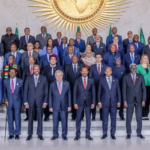In the bustling streets of Harare, Zimbabwe, a unique and thriving subculture exists, a world where the term “Kungwavha-ngwavha” is whispered with both reverence and admiration. This colloquial phrase embodies the spirit of countless individuals who have turned the busy capital’s sidewalks into their own vibrant marketplace. Here, street vendors don’t just sell goods; they carve out livelihoods, exercise business acumen, and contribute significantly to the nation’s economy.
The life of a Harare street vendor is not for the faint-hearted. To succeed, one must become a master of sales and marketing, armed with the skill of identifying potential customers and convincing them to part with their hard-earned cash. In the world of street vending, success requires a unique form of artistry.
As dawn breaks, the vendors mark their territories, unpacking their merchandise and displaying it in a way that tells the story of their journey and experience. Each vendor’s stall is a microcosm of their life’s work, a tangible testament to their tenacity. Amidst this organized chaos, even the “fly-by-night” vendors – those who set up shop for a day – play a part in this ecosystem.
What sets Harare’s vendors apart is the absence of the violence often associated with such street businesses in other parts of the world. In this bustling, competitive marketplace, there’s a remarkable civility that prevails. Vendors mind their own business, aside from a few sharp-tongued individuals who know the value of their words in making a sale.
Beyond the sidewalks, a more substantial part of Harare’s vending community thrives across the Samora Machel Avenue, dealing in wholesale of hardware, groceries, electronics, furniture, and other high-value goods. Over the years, Zimbabwe’s informal sector has grown exponentially, becoming the highest contributor to the nation’s economy.
Zimbabweans are a special breed, a testament to resilience and an indomitable spirit. Impossible has been erased from their vocabulary, and giving up is simply not an option. These streets are a training ground for entrepreneurs, a battleground where both vendors and customers emerge victorious. The sense of unity and purpose among these entrepreneurs is a testament to the strength of the nation’s people.
The future holds the promise of economic transformation, fueled by the growth of the business community. As policies evolve to foster a thriving business environment, and as closed industries are opened up, Zimbabwe is on the path to becoming a middle-income nation. Vendors are not just sellers; they are the backbone of this transformation, deserving respect for their unmatched contribution to the economy.
Imagine a future where vendors evolve into shop owners on the high street, where new brands emerge from the streets, and where e-commerce flourishes. The metamorphosis is not just about goods sold on the street but extends to money changers, bankers, car sales, and even massive brand-new car dealerships. Harare endorses the vendor as the unsung heroes of its economic revival.
The story of Harare’s street vendors is a testament to the power of entrepreneurship and the indomitable spirit of the people. They prove that with the right policies, support, and a shared sense of purpose, a nation can transform itself from the ground up. It’s a journey of hope, resilience, and determination, and the vendors of Harare are leading the way.










